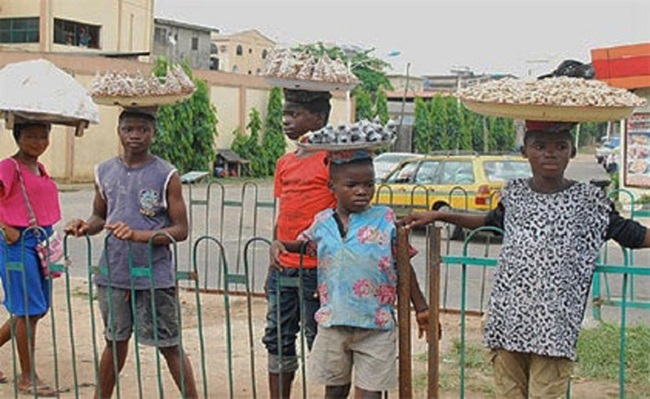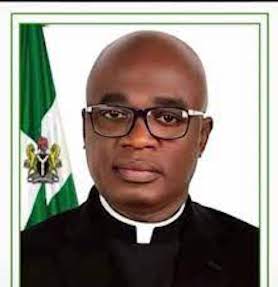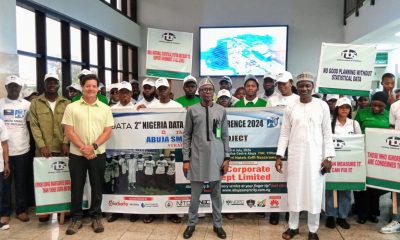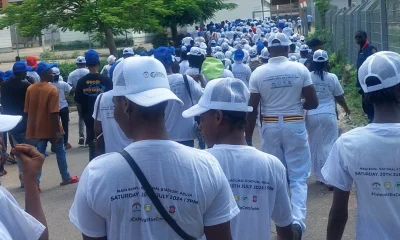FEATURES
The Wrong Worker: Confronting Child Labour in Nigeria

By Prosper Okoye
“Children are the world’s most valuable resource and its best hope for the future.” – John F. Kennedy
The issue of child labour today is at its most dangerous stage compared to the past. In Nigeria, child labour still remains a concept in theory, perhaps an organizing point for some civil society groups and the government to converge yearly on the 12th of June to give speeches that never leave the room in which they were made.
In one way or another, the Nigerian society is responsible for the astronomical growth of child labour. It is either sheer hypocrisy or ignorance of the dangers of child labour on the part of members of society who patronise children that hawk wares or the factory manager who exploits child labour for paltry wages.
What about the affluent elite in the cities who buy children from poor rural homes as house servants, some under the pretence of providing them with a better life, which ultimately turns out to be a falsehood? Even those who give alms to children on the streets are not exempted as agents that perpetuate the evil of child labour, as this act reinforces the system and encourages the adults that use the children to beg to stay in business.One may argue that giving alms, employing the child, or patronizing him or her is, on the contrary, helping the child survive the present economic hardship. However, this line of thinking is entirely false. Former United Nations Secretary-General Ban Ki-moon succinctly disproves this argument: “Child labour in any form perpetuates poverty, robs children of their potential, and compromises their dignity.”
Child labour is defined as the act of employing a child in business or industry, which goes against the Nigerian Federal statutes that prohibit the employment of children below a certain age. According to the Nigerian Labour Act 2004, as amended, a child is classified as a ‘young person’ who is under the age of fifteen (15) years.
This article does not aim to provide statistics on child labour, as it is evident all around us. In 2021, the United Nations predicted that without the implementation of mitigation strategies, the number of children involved in child labour in Nigeria could increase by 8.9 million by the end of 2022. It is shocking that not only did this prediction come to pass, but it was surpassed. In its issue of 31st October 2022, Business Day reported that no fewer than 15 million children are engaged in child labour in Nigeria. With the recent increase in petrol prices, officially sold at 537 Naira per litre and 600 to 700 Naira per litre in the black market, which inevitably affects the cost of other commodities, thereby raising the overall cost of living, it is highly likely that the statistics of child labour will surpass the 15 million mark at the end of 2023.
Instead, this article serves as another plea to the Nigerian society to tackle the underlying causes of child labour.
Without resorting to clichés, these causes include the persistently high rates of poverty that increase vulnerability and drive child labour. These circumstances create a desperate economic situation where families struggle to meet their basic needs, resulting in children being compelled to work to contribute to the household income.
During the former administration of President Muhammadu Buhari, various economic and poverty alleviation programs were implemented. While some were successful, others failed predominantly due to corruption and other factors. For instance, the Trader Moni and other microfinance loan initiatives were hijacked by individuals who allocated them based on personal interests, receiving kickbacks from loan recipients, thereby failing to achieve the intended goals.
So, President Ahmed Bola Tinubu needs to stay watchful and learn from the errors made by the previous administration when implementing economic aid programs. It’s really important to make sure that these initiatives actually benefit the people they are meant for. This is even more crucial now, as discussions are happening about providing help for those facing difficulties due to the removal of subsidies.
In addition to economic aid, steps should be taken to bolster Nigeria’s industrial sector, which would ensure the generation of employment opportunities.
Furthermore, the lack of viable alternatives and limited access to education worsen the issue, trapping children in a cycle of exploitation.
Additionally, the heightened vulnerability of marginalized communities, particularly those affected by conflict or displacement, makes Nigerian children even more susceptible to exploitation through child labour. Incidents of children being taken from Internally Displaced Persons Camps to urban households, where they endure maltreatment and, in some cases, even death, are unfortunately prevalent, though not always reported in the news.
The issue of insecurity and other unfavourable conditions that have resulted in the internal displacement of Nigerians in nearly every state must be earnestly addressed, with a focus on resettling these internally displaced persons (IDPs) back to their homes.
Ultimately, it is crucial to enforce child labour laws in Nigeria, as this serves as a deterrent to those who engage in such practices. “Every child deserves a childhood free from labour and full of possibilities.” – Kailash Satyarthi
FEATURES
Doctor Mark Ogbodo: A Man Destined for Success

By Paul Ugah
Henry Miller once said, “Every man has his own destiny, the only imperative is to follow it, to accept it, no matter where it leads him.”Doctor Mark Ogbodo followed his destiny from the beginning as a leader and an achiever. His leadership qualities blossomed at his tender age, that was why he was identified and made the compound prefect at Holy Family Primary school, Kanshio, Makurdi in 1994.
In the words of an American writer, Casey Stengol, “There are three kinds of people, those who make things happen, those who watch things happen, and those who ask, what happened?” Doctor Mark Ogbodo obviously belongs to the first group in Stengol’s classification. Humble and unassuming, Doctor Ogbodo is a man of integrity, discipline, focus and composure. His mien is a delight.Indeed, the Medical Doctor cum creative writer has endeared himself to his colleagues and people of good minds across the country as a man who makes things happen positively.Though he is not among the richest people in the country but the little he has he always uses it to touch lives across diverse tribes. He also demonstrated this through commitment to community and nation building by organizing several free medical outreaches in the rural areas, sponsoring literary competitions for schools and building of a standard health centre at the rural area to provide good healthcare services at the grassroot.Today Doctor Ogbodo, the Chief Medical Director of Lydia Memorial Hospital, Ugbokolo, has become a celebrity in the medical field and educational sector because of his contributions to the development of the sectors in the country.According to Allen Fred, “a celebrity is a person who works hard all his life to become known”Francis Bacon corroborated the above fact when he rightly asserted that, “fame is like a river that beareth up things light and swollen and drown things weighty and solid”. Little wonder, Longfellow posits, “the heights great men reached and kept were not attained by sudden flight but while their companions slept, they were toiling upward in the night.”In fact, beside Doctor Ogbodo’s hard-work over the years, his life seemed to be destined for success and greatness.This may be the reason why he is succeeding in all his endeavours.Like Doctor Wole Okediran, a Medical Practitioner turned Literary giant, Doctor Ogbodo, aside from his exploits in the medical field, has written creative books that have been recommended for students in secondary schools and other levels of education by the Ministry of Education and Knowledge management and Nigerian Educational Research and Development Council.The works include The Journey- A Flight to Greatness After a Long Walk CA Novel, 2017, Amour Matenel (Novella, 2021), and Untold Novella, 2023.Doctor Ogbodo hails from Obi Local Government Area of Benue State.He started his early education at Holy Family Primary School, Kanshio, Makurdi, Benue State and proceeded to Unique Secondary School in New GRA, Makurdi and got admission into Igbinedion University Okada, Edo state, where he obtained a Bachelor of Medicine and Bachelor of surgery (MBBS).Apart from his natural leadership endowment, the Chief Medical Director, Lydia Memorial Hospital, acquired other numerous training which include certification in leadership and management in Health, University of Washington which made him a leader with difference, Certificate of Achievement by British Council: Ideas for a Better World, Leading Change through Policy Making among others.Some of the positions of responsibilities held by Doctor Ogbodo from past to present includes; Secretary, Fellowship of Christians Students, Unique Secondary School, Makurdi: 2002 to 2003, Secretary Lay Reader Association, STAMS Makurdi: 2003 to 2021, Pioneer Headboy, Unique Secondary School, Makurdi; 2004, Editor-In-Chief (Disciplinary head), Igbinedion University Press Club: 2009 to 2010, Secretary, Federation of Catholic Medical and Dental Students, Igbinedion University, Okada: 2013-2015, National President, Unique Secondary School Old Students Association: 2006-2017, Focal Doctor, Yellow Fever (under NCDC), Ogbadibo LGA: 2020, Assistant Secretary Association of Nigeria Authors, Benue State Chapter: 2021-2022, Secretary, Association of Nigeria Authors, Benue State Chapter: 2022 to 2024.Others are Public Relations Officer, Nigerian Medical Association, Benue State Branch: 2022 till date, Chairman Publication Committee, NMA Benue: 2022 till date, Ambassador National Association of Polytechnic Students: 2023 till date, Ambassador, Federal University of Health Sciences Otukpo: 2024, and Medical Director, Lydia Memorial Hospital, Benue State: 2022 till date.Business Analysis
A Peep Into Dangote’s Refinery, The World’s Engineering Wonder

By Cletus Akwaya
Call it Dangote Republic and you would not be wrong, for that is what it means in real sense.
The ultra-modern Dangote Refinery and Petrochemical complex located at the Lekki Free Trade Zone in Lagos is the World’s Engineering wonder.
A guided tour for top Media executives in the country by the President, Dangote Industries Group himself, Alhaji Aliko Dangote on July 14, provided a rare privilege and opportunity to appreciate the project that has emerged as the World’s largest single train petroleum refinery.
Dangote, the Kano-born business mogul and Africa’s richest man, whose vision for the industrial transformation of Nigeria led to the initiation of this project is certainly a fulfilled person, having accomplished such a gargantuan task in the spelt of just about 10 years.
The refinery, which is built and equipped with the latest technology in the industry. It is a behemoth sitting on a huge land space of 2, 735 hectares, approximately seven times, the size of Victoria Island, the octane section of Lagos, which has become the abode for the very rich in the nation’s commercial nerve – centre over the decades.
The land was provided by the Lagos state government after the payment of $100million dollars by the Dangote Group as cost of the land.
The edifice didn’t come easy as the engineers had to reclaim 65million cubic metres of sand through dredging of the Atlantic coastline to pave way for the construction of the refinery and its accompanying facilities especially the Jetty.
The Dangote refinery is not a stand-alone project as it has a coterie of associated industries and infrastructure making it a self-reliant complex.
For instance, the company has a fully developed port (jetty)for maritime operations for both in-take of crude and discharge of refined products. This perfectly compliments the huge pipeline network that lands into the Atlantic for intake of crude and loading of refined products to ships. Its Jetty, which stretches 9KM into the international waters in the Atlantic Ocean and 12.5 KM from the refinery is perhaps one of the most modern in the world built with sand piles that shield the final landing points from the violent oceanic waves, thus providing for safety and stability of ships, barges and oil tankers.
The complex is accessed by 200KM network of concrete under-lay and well asphalted road network to ease vehicular traffic. The refinery has its dedicated steam and power generation system with standby units to adequately support operations of the various plants in the complex.
It has successfully completed a 435 MW power generating plant for its operations. The power generated from this plant surpasses the entire distribution capacity of Ibadan Electricity Distribution company, which supplies electricity to five states of the Federation including Oyo, Osun, Ondo, Ekiti and Kwara.
The Dangote refinery with a capacity of 650,000 bpd of crude oil is designed to handle the crude from many of the African countries, the Middle East and the US light crude. Its petrochemical plant is designed to produce 77 different high-performance grades of polypropylene, which is the major raw material for numerous industries and other refineries. With a huge refining capacity, Alhaji Dangote said the products from the refinery company would easily meet 100 per cent the needs of Nigeria’s demand for gasoline, diesel, Petrol and Aviation Jet with 56 per cent surplus for export, from which the company projects to earn a princely $25billion per annum from 2025.
The company has facility to load 2,900 trucks with its various products in a day by land and millions of litres of products through the waters depending on where the orders come from. The $25million projected revenue in 2025 could translate to a huge relieve for the nation in dire need of foreign earnings to shore-up the value of the nation’s currency.
The associated industry, the Dangote Fertilizers Limited also situated in the complex utilises the raw materials from petrochemicals to produce different varieties of fertilzers especially Urea, NPK and Amonia grades of fertilizers. Apart from the local market, Dangote is already exporting its fertilizers to other countries including Mexico, a testament to its high quality that meets world standards.
This feta, the President of Dangote industries explained was possible because of the high quality, the company has opted to pursue. In between the refinery and the fertilizers complex lies a 50,000 housing estate, which provided accommodation for the construction workers at the time of construction especially during the COVID-19 lockdowns of 2020, when workers remained encamped on the project site to continue with the work.
What stands out the Dangote Refinery is perhaps not in its sheer size and capacity but in the fact that it is perhaps the only of such projects whose Engineering, Procurement and construction(EPC) was done directly by the company without engaging the world renowned refinery constriction companies like Technip Bechtel (USA)Technip (France)Aker Solutions (Norway)Chiyoda Corporation (Japan)SNC-Lavalin Group (Canada)J. Ray McDermott (USA)JGC Corporation (Japan)Hyundai Heavy Industries (South Korea)Foster Wheeler (USA) and Daelim Industrial Company (South Korea)
“The design of the refinery was handled by dozens of Engineers and technical experts assembled in India and Houston, Texas, USA to execute engineering designs of the refinery,” said Edwin Kumar, the Executive vice President, Oil and Gas for the Dangote Group who midwifed the birth of the refinery complex.
“We didn’t give out contracts to anybody, we bought every single bolt and equipment ourselves and had it shipped into the country,” Dangote explained to his guests.
Part of the equipment imported into the country was the procurement of over 3,000 cranes to handle the evacuation of huge consignments of machinery from the wharf and for subsequent installation at the construction site. The cranes have become an unusual assemblage of such equipment to be found in one place on the African continent.
If there was any doubt that Alhaji Aliko Dangote is Africa’s richest man, the successful completion of the refinery and petrochemical complex at the cost of about $20billion has further confirmed his status as Africa’s leading businessman and entrepreneur.
However, Dangote does not really accept that he is the richest man on the continent,
“When you are rich, you accumulate cash, but when you wealthy, you create wealth” he told the top Media executives on tour of the huge project, explaining that he would rather prefer to be referred to as a “Wealthy man.”
And consistent with his business philosophy, Dangote hinted of plans to list the refinery on the Nation’s stock exchange by the first quarter of 2025. His vision is to avail the public of 20 per cent of the shares so as to ensure participation by Nigerians and even international portfolio investors.
The refinery company and the entire of Dangote Group at the moment provides direct employment to about 20,000 Nigerians and much indirect jobs to Nigerians, making it the highest employer of labour outside the government.
Most interestingly, the highly technical operations of Dangote refinery is operated by over 70 per cent of local manpower who work in the refinery control, centre, the numerous production and quality control laboratories among others. Some of the staff who explained their tasks to the visiting media executives said they were graduates of Engineering and allied disciplines recruited mostly from Nigerian universities and trained in various institutions abroad for periods ranging from sixth months – one year to master refinery operations. Through this strategy, Dangote has ensured transfer of technology to thousands of Nigerian youths.
“We don’t know where they come from as long as they are Nigerians and if they decide to leave and join international oil companies for better job opportunities, we have no problem with that,” Dangote responded to a question on the strategy to retain the technical manpower for stability of the refinery’s operations.
The Dangote Refinery is a Republic of some kind, at least an economic or industrial Republic.
But the man who presides over this ‘industrial empire’, Alhaji Dangote says his only ambition is to boot the nation’s economy and ensure netter life for Nigerians.
“When you import any product into Nigeria, you are importing poverty and exporting our jobs to those countries from where you are importing” Dangote said adding “this is why I want economic nationalism in Nigeria.”
Dangote’s vision even goes beyond Nigeria as he has cement factories and other business concerns in about 13 African countries including Ghana, Ethiopia, Tanzania, Uganda, etc. This signifies his continent-wide dream to transform Africa’s economies.
There has been attempts by some international oil companies to frustrate the successful take-off of the refinery, through over pricing and in some instances outright denial of crude supplies for processing. This made Dangote to commence importation of crude from the US. However, the cheering news that the Nigerian National Petroleum Company Limited (NNPC) has finally approved a supply arrangement has raised hopes that full operations will commence and that the long-awaited Dangote oil products will reach consumers around the country from August.
At last, the Dangote Group may have achieved its objective to serve as the elixir to Nigeria’s industrialisation effort. This is perhaps the greatest legacy of Africa’s richest man to his country of birth.
FEATURES
Benue: Turning Trash to Economic Boom

By Bridget Tikyaa
Amidst challenges of unemployment and environmental degradation, the Benue State Government is taking new initiatives to not only create jobs but also provide comprehensive sustainable solutions to the threats posed to public health and the environment by the huge quantum of waste across the state.
The innovative solutions are part of a deliberate policy of the government to turn trash to wealth and generate a boom for the economy.
The government began by setting up an agency to drive the initiatives. The Bureau of Entrepreneurship and Wealth Creation, which has Benita Shuluwa as pioneer Director General, has the mandate to initiate, develop, and execute wealth creation initiatives in alignment with the state government’s vision across the entire value chain, in collaboration with relevant government agencies, and promote innovative entrepreneurship programmes by forging partnership with the organised private sector, potential investors and technology hubs.
The Bureau is also to compile data and statistics related to employment and wealth creation, establish job registration centers and skills acquisition and capacity building programmes to advance entrepreneurship.
Its mandate also include: accelerating intergovernmental cooperation on business development, ensuring ease of doing business and developing inclusive and sustainable partnerships with Community Based Organizations, the Legislature, Development Partners, Organised Private Sector, Central Bank of Nigeria, Bank of Industry, Nigerian Investment Promotion Commission, among others.
The government was also well intentional as it mandated the Bureau to support indigenous innovative and skilled individuals and groups to stimulate the innovation ecosystem.
Thus, one key step taken to realise this dream was the partnership agreement signed by the government with Sector Lead Limited to execute a comprehensive Waste-to-Wealth Project in the state. It is a move that will make trash from households useful, an economic treasure and a source of providing massive employment.
According to Shuluwa, the partnership will bring in more than $194 million to be spent over the coming years on enhancing environmental sustainability, creating jobs, boosting revenue, and generating 35MW electricity, biofertilizer and biogas among other derivatives.
In addition to these derivatives, the project will enable the government to be issuing Carbon Credit, reclaim and vegetate dump sites and landfills for agricultural and infrastructural gains.
No doubt, the Waste-to-Wealth project is a legacy project that will boost the economy of Benue state by turning trash into wealth thereby creating an economic boom for many residents.
The partnership is in continuation of the decisive interventions made by the government in streamlining the mining sector and its degenerative effect on the environment.
The government through the entrepreneurship Bureau began by restructuring the mining sector to derive maximum benefit from the vast mineral deposits being tapped by registered and illegal miners across the state.
It also collaborated with the Federal Ministry of Interior through the Nigerian Fire Extinguisher Scheme (NFES) to employ 1,450 with a prospect of employing up to 10,000 youth across the state, a move that has reduced unemployment.
Also important to note is the rehabilitation of ICT hubs and tailoring workshops at BENCEDI Skills Acquisition Centre to provide youth in the state with appropriate training to effortlessly key into the 21st century digital economy.
The administration of Governor Alia is no doubt pushing the boundaries, taking bold and decisive steps to make a huge difference by streamlining the Benue economy for the benefit of all, thereby advancing the state’s GDP to the top of the chart from the current 12th position in the country.
Bridget Tikyaa is the Principal Special Adviser to the Governor on Media, Publicity/Communications Strategy.
























